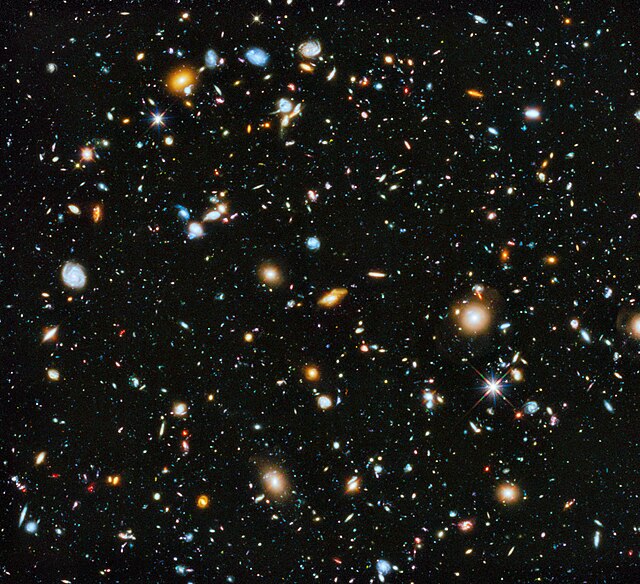神祇
From Wikipedia, the free encyclopedia
Remove ads
神祇(粵音:san4 kei4),亦都叫神,係指天神同地祇,泛指一齊嘅神明。

宗教可以根據佢哋崇拜嘅神嘅數量來分類。一神教嘅宗教只接受一個神(通常稱為「神」),[1][2]而多神教嘅宗教則接受多個神。[3]一神崇拜嘅宗教接受一個至高無上嘅神,但唔否認其他神嘅存在,認為佢哋係同一神聖原則嘅唔同方面。[4][5]非神論宗教否認有任何至高無上嘅永恆創世神,但可能接受一個萬神殿,裏面嘅神可以生存、死亡同重生,就好似任何其他生物一樣。[6]:35–37[7]:357–358
雖然大多數一神教傳統上將佢哋嘅神視為全能、無所不在、全知、全善同永恆,[8][9]但呢啲特質唔係定義「神」嘅必要條件,[10][11][12]唔同文化對佢哋嘅神有唔同嘅概念。[10][11]一神教通常用男性詞彙來指稱佢哋嘅神,[13][14]:96而其他宗教則用多種方式來指稱佢哋嘅神——男性、女性、雌雄同體或無性別。[15][16][17]
好多文化——包括古代美索不達米亞人、古埃及人、古希臘人、古羅馬人同日耳曼民族——都將自然現象人格化,以唔同方式將佢哋視為有意識嘅原因或結果。[18][19][20]有啲阿維斯陀同吠陀嘅神被視為倫理概念。[18][19]喺印度宗教中,神被想像為喺每個生命體嘅身體廟宇入面顯現,成為感官同心智。[21][22][23]神被視為輪迴後嘅一種存在形式,對於過有德行生活嘅人類來講,佢哋成為守護神並喺天堂過幸福嘅生活,但當佢哋嘅功德耗盡時,都會面臨死亡。[6]:35–38[7]:356–359
Remove ads
定義

冇一個普遍接受嘅共識話神係乜嘢,唔同文化對神嘅概念都好唔同。[14]:69–74[26] Huw Owen話「神或者上帝或者喺其他語言入面相等嘅詞」呢個詞有好多唔同嘅意思同重要性。[27]:vii-ix 佢嘅意思由「創造同掌管宇宙嘅無限超然存在」(上帝),到「有特殊意義或者引起特殊感覺嘅有限實體或經歷」(神),到「喺宗教或哲學背景下同大自然或者放大咗嘅存在或者超凡領域有關嘅概念」,以至「好多其他用法」都有。[27]:vii–ix
一個神通常被概念化為一個超自然或神聖嘅概念,喺某啲或者所有方面都表現出卓越,同時喺其他方面又要同弱點同問題搏鬥,有英雄主義嘅看法同行為,但又同情感同慾望糾纏喺一齊。[28][29] 喺其他情況下,神可能係一個原則或者現實,好似「靈魂」呢個概念咁。例如,印度教嘅奧義書將阿特曼(靈魂、自我)描述為deva(神),從而確定deva同永恆嘅最高原則(梵)係每一個生物嘅一部分,呢個靈魂係精神同神聖嘅,而認識自我就係認識最高嘅。[30][31][32]
有神論係相信存在一個或者多個神。[33][34] 多神論係相信同崇拜多個神,[35] 呢啲神通常組成一個萬神殿,仲有相應嘅儀式。[35] 喺大多數多神教入面,唔同嘅神同女神係自然力量或者祖先崇拜原則嘅代表,可以被視為自主嘅,又或者係創造神或者超越嘅絕對原則(一元論神學)嘅方面或者放射,喺自然界內在地顯現。[35] 一神教多神論接受有多過一個神嘅存在,但係認為所有神都係同一個神聖原則嘅等同代表或者方面,呢個係最高嘅。[5][36][4][37] 單一神教係相信有好多神存在,但係只可以合法崇拜其中一個神。[38][39]
一神論係相信只有一個神存在。[40][41][42][43][44][45][46]一個一神論嘅神,通常叫做「上帝」,通常被描述為全能、無所不在、全知、全善同永恆。[47] 不過,唔係所有神都係咁樣被睇待,[10][12][48][49] 一個實體唔需要係全能、無所不在、全知、全善或者永恆先可以算係神。[10][12][48]
Remove ads
史前時期

想知多啲:史前宗教
學者推斷喺史前時期應該有神明嘅存在,根據石刻同史前藝術,例如洞穴畫,但其實唔清楚呢啲畫係乜嘢同埋點解會畫出嚟。[52] 有啲刻畫或者畫作顯示咗動物、獵人或者儀式。[53]
曾經有段時間,考古學家幾乎將所有史前女性雕像都解釋為一個原始女神嘅象徵,呢個原始女神係歷史上確認嘅女神,例如伊南娜、伊絲塔、阿斯塔蒂、賽貝同阿芙蘿黛蒂嘅祖先;[54] 但而家呢個說法大部分都被否定咗。[54] 現代考古學家一般認為,係唔可能將任何史前雕像確實認定為任何形式嘅神明,唔好講女神啦。[54] 不過,仍然可以逐個案去評估古代嘅雕像,睇下有幾大可能係代表神明。[54]
威倫多夫維納斯,一個喺歐洲發現嘅女性雕像,約公元前25,000年,俾人認為係史前女神嘅一個例子。[53] 喺'Ain Ghazal發現咗幾個可能代表神明嘅雕像[54],同埋喺Çatalhöyük出土嘅藝術品,顯示咗一個可能係複雜嘅神話嘅參考。[54]
Remove ads
神嘅形象
睇埋:神話
自然神
内文:自然神靈
自然神(Natural God)源自原始社會嘅後期,將駕馭唔到嘅自然體、自然力演化做神,喺拜物教初期,直接將自然體,好似火、雷、水、太陽等直接加人格化,認為佢哋本身係有意志同生命,之後甚至都神化動物植物,隨著啲人嘅抽象能力增強,神靈獨立喺自然物體嘅觀念都逐漸萌生。
社會神
社會神(Social God)將社會現象或者力量人格化,源自原始社會後期,係自然神嘅演化,隨著生產力嘅發展同社會結構複雜化、階級化,人唔再係一個個嘅個體,社會力量都俾人話係理解唔到同唔到以駕馭嘅力量,好似戰神、愛神、財神、地域守護神、行業神等等。
社會神有好多分支,可以分做兩大類:第一類同自己嘅先天身份(宗族)有關,可以叫做宗族神;第二類就同自己嘅後天身份(好似行業)有關,喺依類入面最主要嘅係行業神。
分支
- 宗族神,同自己嘅宗族有關。
- 家神(Family God)係家庭嘅守護神,通常係供奉本家嘅祖先,信者覺得祖先做咗神,可以守住家庭安穩,喺依方面某程度上係部落神嘅類同,但係家神都有將家族分宗同標立家族獨特性嘅功用,不同部落神嘅係家神少有合併歸流。
- 部落神(Tribal God)同部落起源或者成個部落起源有關。(睇埋:圖騰)
- 民族神(National God)係幾個較大部落嘅部落神嘅合併體,或者幾位同宗教嘅主神。民族嘅消滅都唔會令個民族神消失,因為佢有可能畀其他民族吸收同化。
- 行業神(Trade God)都可以算係社會神嘅一支,隨住社會分工而產生,多數同神話或各行嘅首創者、有功者有關,好似中國嘅魯班、古希臘嘅阿耳忒彌斯等。
睇埋
Wikiwand - on
Seamless Wikipedia browsing. On steroids.
Remove ads
